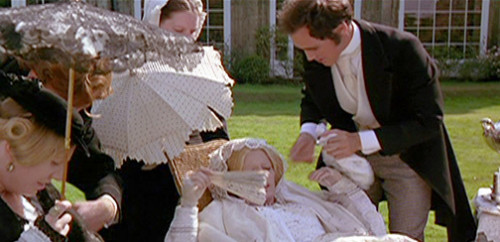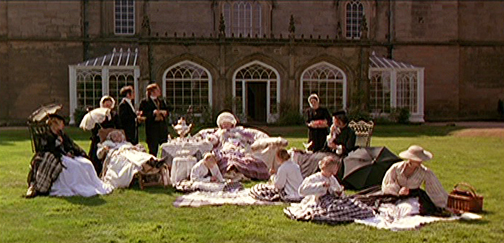The Midsummer’s Day picnic is ruined when flying ants fall into the strawberries, cucumber sandwiches, and silver cream jugs. Everyone runs for cover.
Belying the humor, the dying ants in e cream jugs and teacups, is Byatt’s metaphor contrasting the natural world with the social relationships among the English landed gentry.
It presages the ruin of William Adamson and Eugenia Alabaster’s marriage, which is destroyed when he learns that the father of their children is Eugenia’s brother Edgar. William loves her, but Eugenia prefers Edgar: “I know it was bad, but you must understand it didn’t feel bad…” (A reader may take this as either droll humor or horrendous sensationalism, the kind you get in Gothic romances. Having revised the title of the novella Morpho Eugenia, Haas might have more pungently renamed the film Angels & Incest.)
 Byatt compares the ants to Icarus or falling angels meeting their end pitchers, “a creamy suffocation, or by drowning in a steaming cauldron of fragrant Mysore in the midst of our own strawberry picnic.”
Byatt compares the ants to Icarus or falling angels meeting their end pitchers, “a creamy suffocation, or by drowning in a steaming cauldron of fragrant Mysore in the midst of our own strawberry picnic.”
The cast: Mark Rylance as William; Patsy Kensit as Eugenia.
See A.S. Byatt. Morpho Eugenia. In Angels & Insects, Two Novellas. London: Chatto & Windus, 1992; Michelle Weinroth “Morpho Eugenia” and the fictions of Victorian Englishness: A.S. Byatt’s Critique. English Studies in Canada (2005); Alexa Alfer and Michael J. Noble, eds. Essays on the Fiction of A. S. Byatt: Imagining the Real. Westport: Greenwood Press, 2001.
Featured image: Byatt’s ants are Red Wood Ants, Formica rufa. During its mating season, the winged ants mate, swarm, and die, except for the queen and a few worker bees.

